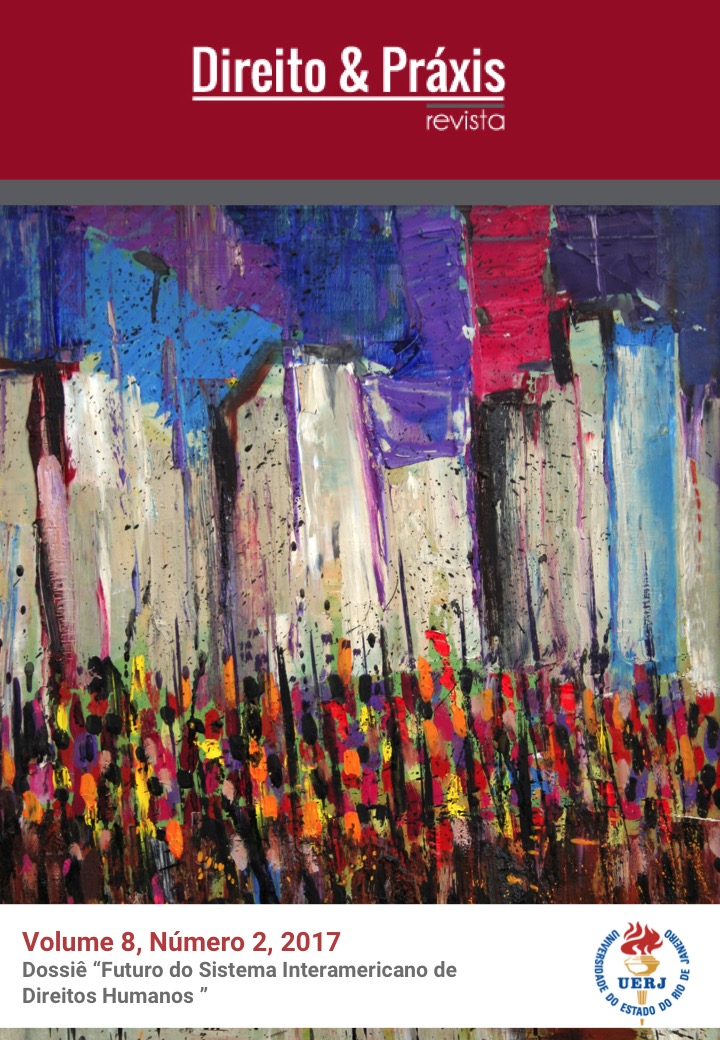A grande aliança: história, razão e vontade no direito moderno / The great alliance: history, reason, and will in modern law
DOI:
https://doi.org/10.12957/dep.2017.28771Palavras-chave:
Direito moderno, direito como imaginação moral, racionalismo e historicismo jurídico, vontade popular e direito, A Grande Aliança. / modern Law, law as moral imagination, legal rationalism, legal historicism, popular will and law, The Great Alliance.Resumo
DOI: 10.12957/dep.2017.28771
Resumo
Este artigo oferece uma interpretação das origens intelectuais e políticas do direito moderno fincadas no século dezenove, bem como de suas consequências para o pensamento jurídico contemporâneo. Estudos sócio-teoréticos do direito e do pensamento jurídico tendem a enfatizar ruptura e mudança. Histórias do pensamento jurídico tendem a oferecer uma imagem de combate entre as diferentes escolas de teoria do direito. Tais estudos e histórias falham em dar conta do quanto o pensamento jurídico do presente é uma continuação de um pacto teórico-jurídico lavrado no século dezenove. Um pacto que domou a vontade das massas através da influência de um pensamento jurídico de autoridade e prestigio, de concepções morais do político e de uma ideia generalizada de evolução social. O principal mecanismo do pacto teórico foi uma aliança entre racionalismo e historicismo jurídicos, ao qual aderiu a vontade das massas. Após um período de polarização ao redor da época das revoluções americana e francesa, no século dezenove o racionalismo jurídico passou a ver eventos históricos como produto da sabia e habilidosa operação da razão no mundo, e o historicismo jurídico passou a socorrer-se das operações racionalizadoras da ciência jurídica para dotar o material histórico tanto de estabilidade conceitual quanto de autoridade intelectual. A vontade popular aceitou ambas as operações. O direito moderno e as principais escolas do pensamento jurídico permaneceram, desse então, aprisionadas à esta convergência entre razão e história em face da vontade popular. O direito moderno é portanto tanto marcado por continuidades quanto o é por rupturas; tanto por unidade quanto o é por querelas.
Palavras-chave: direito moderno; direito como imaginação moral; racionalismo jurídico; historicismo jurídico; vontade popular e direito; A Grande Aliança; The Great Alliance.
Abstract
This article offers an interpretation of the intellectual and political origins of modern law in the nineteenth century and its consequences for contemporary legal thought. Social theoretical analyses of law and legal thought tend to emphasize rupture and change. Histories of legal thought tend to draw a picture of strife between different schools of jurisprudence. Such analyses and histories fail to account for the extent to which present legal thought is the continuation of a jurisprudential settlement that occurred in the nineteenth century. That settlement tamed the will of the masses under the influence of authoritative legal thought, conceptions of political morality, and a general sense of social evolution. The principal mechanism of the settlement was a compact between legal rationalism and historicism to which popular will acceded. After a period of polarization around the time of the American and French revolutions, nineteenth century legal rationalism came to see historical events as the outcome of the cunning operation of reason in the world, and legal historicism came to appeal to the rationalizations of legal reason in order to endow historical matter with both conceptual stability and intellectual authority. Popular will bought into both. Modern law and the main schools of legal thought have remained, ever since, bound to this convergence of reason and history in the face of will. Modern law is therefore as much about continuity as it is about rupture; as much about unity as it is about strife.
Keywords: modern Law; law as moral imagination; legal rationalism; legal historicism; popular will and law; The Great Alliance.
Downloads
Downloads
Publicado
Como Citar
Edição
Seção
Licença
Os textos são de exclusiva responsabilidade de seus autores.
É permitida a reprodução total ou parcial dos artigos da Revista Direito e Práxis, desde que citada a fonte.
Este trabalho está licenciado sob uma Licença Creative Commons 4.0, Atribuição-Sem Derivações.
Esta licença permite copiar e redistribuir o material em qualquer suporte ou format para qualquer fim, mesmo que comercial, desde de que citada a autoria original.
This work is licensed under a Creative Commons Attribution 4.0 International License.




